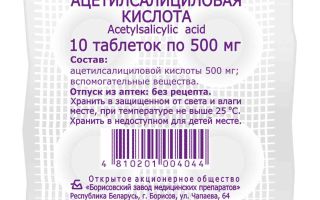Content
- 1 The history of the appearance of Aspirin
- 2 Chemical composition of Aspirin
- 3 The mechanism of action of Aspirin
- 4 Why Aspirin is useful
- 5 Aspirin increases or decreases blood pressure
- 6 Does Aspirin help with headaches
- 7 Indications for the use of Aspirin
- 8 Admission rules and dosage of Aspirin
- 9 The use of Aspirin in cosmetology
- 10 Aspirin harm and side effects
- 11 Contraindications to the use of Aspirin
- 12 Can Aspirin during pregnancy
- 13 Can I give my child Aspirin
- 14 Interaction of Aspirin with other substances
- 15 Aspirin and alcohol
- 16 Aspirin's analogs
- 17 Conclusion
- 18 Reviews
In modern medicine, several useful drugs of a century ago are used, which are included in the so-called "golden fund" of drugs. One of these medications is Aspirin. The benefits and harms of Aspirin imply its use in accordance with certain indications.
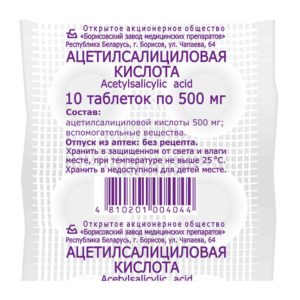
The history of the appearance of Aspirin
1999 marked the 100th anniversary of the creation of Acetylsalicylic Acid (ASA). Acetylsalicylic acid, the benefits and harms of which have been sufficiently studied, is considered one of the most demanded medicines. The pharmaceutical industry offers more than 100 drugs that include ASA as the main substance.
For the first time, the source of Aspirin was mentioned 4000 years ago. People have used a decoction of willow leaves and bark to treat colds, fevers, and other conditions. The crystalline substance, which was called salicyl, was obtained in 1829. Salicylic acid was created in 1839.
The first factory for the production of salicylates was founded in 1874. At the German firm Bayer in 1888, a pharmaceutical department was organized, producing salicylic acid.
The substance was distinguished by its cheapness and the presence of toxic properties, which limited its use in medical practice. It is this fact that led to the emergence of a useful drug.
In 1897, a method was described by which it was possible to obtain practically pure acetylsalicylic acid. ASA had a high pharmacological activity and did not have a significant irritating effect on the gastric mucosa. The new drug was named Aspirin and was launched in 1898 as an antipyretic, analgesic and pain reliever.
Chemical composition of Aspirin
The beneficial properties of Aspirin are due to its chemical composition. It also contains other drugs with different chemical structures (Indomethacin).
Aspirin or ASA is an ester that is formed by salicylic and acetic acid. Salicylic acid reacts as phenol in the formation of ASA.
The substance is a white crystalline powder or crystals, colorless and odorless. Low odor and slightly acidic taste are allowed. ASA is poorly soluble in water, ethanol and chloroform. Aspirin is highly soluble in alcohol, ether and alkali.
The mechanism of action of Aspirin
Aspirin has the following types of beneficial effects on the body:
- Anti-inflammatory... The agent suppresses the phase of inflammation, in which blood flows out through the vascular wall and edema. The drug reduces the formation of inflammatory mediators, such as prostaglandins.
- Antipyretic... Experts believe that this action is also associated with blocking the synthesis of prostaglandins. A decrease in temperature occurs in response to vasodilation in the skin.
- Pain reliever... This mechanism is represented by a peripheral and central component. The increasing level of prostaglandins increases the sensitivity of the nerve endings. With a decrease in the concentration of prostaglandins, a decrease in pain syndrome is noted.
- Antiplatelet... Aspirin is used for pathologies of the cardiovascular system, for example, ischemic heart disease. The benefit is expressed in the prevention of thrombus formation due to the properties of the substance.
- Antithrombotic... Useful properties are due to the short circulation of the substance in the blood and inhibition of the synthesis of the main factor of the blood coagulation system (the precursor of thrombin).
Why Aspirin is useful
Useful properties are used for various pathological conditions. In particular, Aspirin is beneficial for the heart. The medicine is used for prophylactic purposes in accordance with international recommendations.
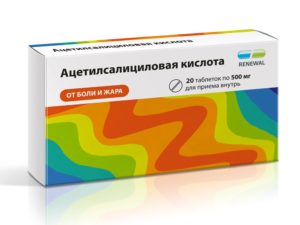
With cardiovascular diseases
The benefits of taking pills for heart disease have been proven. The beneficial properties of Aspirin for blood vessels have also been noted in the course of research.
Often Acetylsalicylic acid is prescribed for atherothrombosis. Against the background of this pathology, an atheromatous plaque is formed, which is covered with a thrombus. When large blood clots form, the consequences can be quite serious. The harm lies in the danger of death.
Aspirin is considered the first antiplatelet drug to treat and prevent atherothrombosis and disease-related complications. This has to do with its beneficial properties.
ASA is useful for the prevention of myocardial infarction and ischemic stroke. As part of a prophylactic intake, daily use of Aspirin in small dosages is recommended, which is beneficial.
The drug is used with caution in diabetes mellitus, hypertension, gastritis and gastric ulcer, pregnancy, breastfeeding.
With oncology
It is believed to be beneficial for some types of malignant tumors. As a result of studies, it has been proven that ASA at a dose of 75-100 mg per day reduces the risk of cancer. The mechanism behind the beneficial anti-cancer properties is not well understood.
Long-term observations have shown a decrease in the likelihood of developing cancer of the colon, rectum, stomach by 20%. The benefits of Aspirin for men are obvious. According to statistics, it is men who are more likely to suffer from a malignant tumor of the rectum. If we talk about the benefits of Aspirin for men, one should also point out its beneficial properties for the prostate.
However, the anti-cancer effect occurs against the background of prolonged use of drugs, for example, over 15-16 years. When you stop taking it, the anti-cancer effect disappears within a few years.
Aspirin increases or decreases blood pressure
Aspirin may be beneficial for hypertension. The drug has no direct effect on the mechanisms responsible for the level of pressure.
Aspirin has been shown to be beneficial and harmful when used to thin the blood. It is this property that causes a decrease in pressure. The medicine is prescribed for therapeutic and prophylactic purposes in case of persistent hypertension, the risk of strokes and heart attacks.
The healing property of a substance depends on the time of day. Benefits can be expected if Aspirin is taken at night.Experts emphasize that it is recommended to reduce pressure with ASA only in case of pronounced symptoms. Otherwise, the use of the tool is impractical.
Does Aspirin help with headaches
Aspirin can be helpful for intense headaches due to its powerful analgesic effect. Elimination of pain syndrome is due to blocking the synthesis of prostaglandins and suppression of the activity of pain receptors. Thus, the production of substances responsible for the occurrence of edema, pain and inflammation is stopped.
According to the instructions for the drug, Aspirin can be prescribed to eliminate headaches, in particular migraines. The drug can only be prescribed to patients who have reached the age of 15 years. The dosage taken depends on the intensity of the headache and is no more than 3 g per day. In the elderly, the maximum dose is reduced to 2 g.
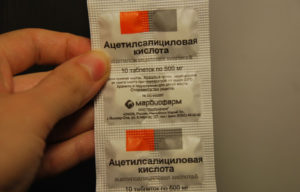
Indications for the use of Aspirin
Acetylsalicylic acid is a popular drug due to its many indications. The benefits of acetylsalicylic acid for the human body have been proven as a result of experimental studies.
The instructions for the drug indicate the following indications for the use of ASA:
- symptomatic relief of toothache, joint and muscle pain;
- elimination of headaches of varying intensity;
- menstrual pain;
- elevated temperature against the background of acute respiratory viral infections and the inflammatory process.
Admission rules and dosage of Aspirin
The drug is intended for oral administration and is prescribed for adults and adolescents who have reached 15 years of age. Aspirin is taken orally, always after meals. The tablet should be taken with plenty of water.
The duration of use depends on the severity of the symptoms and the doctor's prescription. Self-administration should not exceed 7 days, which is due not only to the beneficial properties of the drug. The drug can be harmful with prolonged use without the appointment of a specialist.
The dosage of the drug depends on the indications for admission. The average dose varies from 0.5 to 1 g. The allowable interval between doses is 4 hours or more.
The use of Aspirin in cosmetology
Acetylsalicylic acid is a popular drug used to treat pain and signs of inflammation. The advantages of the drug are availability, cheapness, and over-the-counter. However, the healing properties of Aspirin are not limited to its main indications for taking.
Aspirin is successfully used in cosmetology. The product can be used to cleanse facial skin due to its beneficial properties. Aspirin-based masks are recommended in the following cases:
- combination or oily skin;
- acne, acne.
ASA penetrates deeply into the skin, improving its condition and appearance. Masks with Acetylsalicylic acid give the skin a healthy look, due to the beneficial properties of the active ingredient. As a result of regular use of the product, you can expect elimination:
- oily sheen;
- enlarged pores;
- blackheads (acne);
- rashes of any kind.
Aspirin face mask recipes
Masks with ASA are recommended for age spots, rashes, wilting, increased oily skin. Treatment is not carried out during lactation and pregnancy, allergies, dilated vessels.
To prepare a classic mask, 6 tablets of Acetylsalicylic acid must be dissolved in a teaspoon of boiled water. The skin must first be cleaned of impurities and cosmetics. The mixture is applied to the skin of the face before going to bed and washed off after 20 minutes.
You can get rid of acne, age spots with a useful lemon mask. To prepare it, you will need 2 tablespoons of lemon juice and 6 Aspirin tablets. The exposition is 10 minutes.
Acetylsalicylic acid mask is useful at the first signs of skin aging. An equal amount of water and honey is mixed with 4 Aspirin tablets. The mixture is applied in a thin layer and washed off after 10 minutes.
For oily skin, water, oatmeal and kefir are added to 4 Aspirin tablets. The duration of the mixture is 15 minutes. You can eliminate wrinkles and pimples with a mask of Aspirin and white clay tablets, which should be taken in equal parts.

Aspirin harm and side effects
If you use Aspirin every day, you can expect not only benefits, but also harm. Against the background of the use of ASA, the following side effects may occur:
- Digestive system... In some cases, the following symptoms are observed: nausea, heartburn, vomiting, pain syndrome. Gastrointestinal bleeding can lead to anemia, lesions of an erosive and ulcerative nature. Long-term intake of Acetylsalicylic acid is harmful in the form of increased activity of liver enzymes.
- Nervous system... Dizziness or tinnitus is common, indicating an overdose.
- Hematopoietic system... There is a risk of bleeding.
Contraindications to the use of Aspirin
Despite its medicinal properties, Aspirin can be harmful. Before taking the substance, it is necessary to take into account possible contraindications.
Experts call the following contraindications, in which it is not recommended to use the medicine:
- exacerbation of erosive and ulcerative lesions related to the gastrointestinal tract;
- diathesis of a hemorrhagic nature;
- bronchial asthma due to NSAIDs;
- combined use with methotrexate;
- first or last trimester of pregnancy;
- lactation;
- hypersensitivity reactions.
With caution, the medicine can be taken during pregnancy 2 trimesters, nasal polyposis, a history of peptic ulcer disease.
Can Aspirin during pregnancy
The benefits of Aspirin for women are undeniable. The medicine is prescribed for various pathological conditions. Many pregnant women have a question whether it is possible to take acetylsalicylic acid during the period of gestation. The possibility of admission depends on the period of gestation.
The use of the product is prohibited in the 1st and 3rd trimesters of pregnancy. The harm is due to the increased risk of birth defects in the child and the weakness of labor. It is possible to use tablets in the second trimester only after the permission of the doctor.
Can I give my child Aspirin
The possibility of using Aspirin is directly related to its properties and effects on the body. The medicine thins the blood and blocks the production of substances that affect the onset of pain. The use of the product is allowed from the age of 15. Taking it at an earlier age can harm the child's body.
Interaction of Aspirin with other substances
Co-administration of methotrexate increases its toxicity. An increase in the effect is also observed with the simultaneous use of other NSAIDs, narcotic analgesics, thrombolytics, diuretics, heparin, hypoglycemic and antihypertensive drugs.
Glucocorticosteroids can increase the adverse effects on the gastric mucosa. The harm also manifests itself in the risk of bleeding. Antacids slow down the absorption of ASA.
Aspirin and alcohol
Drinking alcoholic beverages during therapy is prohibited. The harm lies in the likelihood of gastrointestinal bleeding and damage to the mucous membranes of the digestive system.
Aspirin's analogs
Aspirin is not the only one that has blood thinning properties. Analogues of antiplatelet agents are also beneficial.
Experts call the following drug analogues with a similar mechanism of action:
- Aspirin Complex;
- Sodium salicylate;
- Tsefekon N;
- Cofacil-Plus;
- Aspagel.
Conclusion
The benefits and harms of Aspirin are beyond question. The tablets have a wide range of indications. They are used not only for indoor but also outdoor use. Before taking, you should consider contraindications and possible side effects that may be harmful.
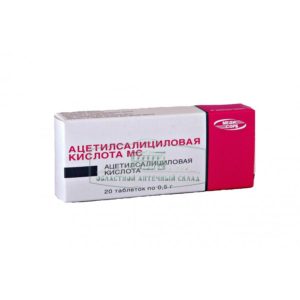
Reviews

